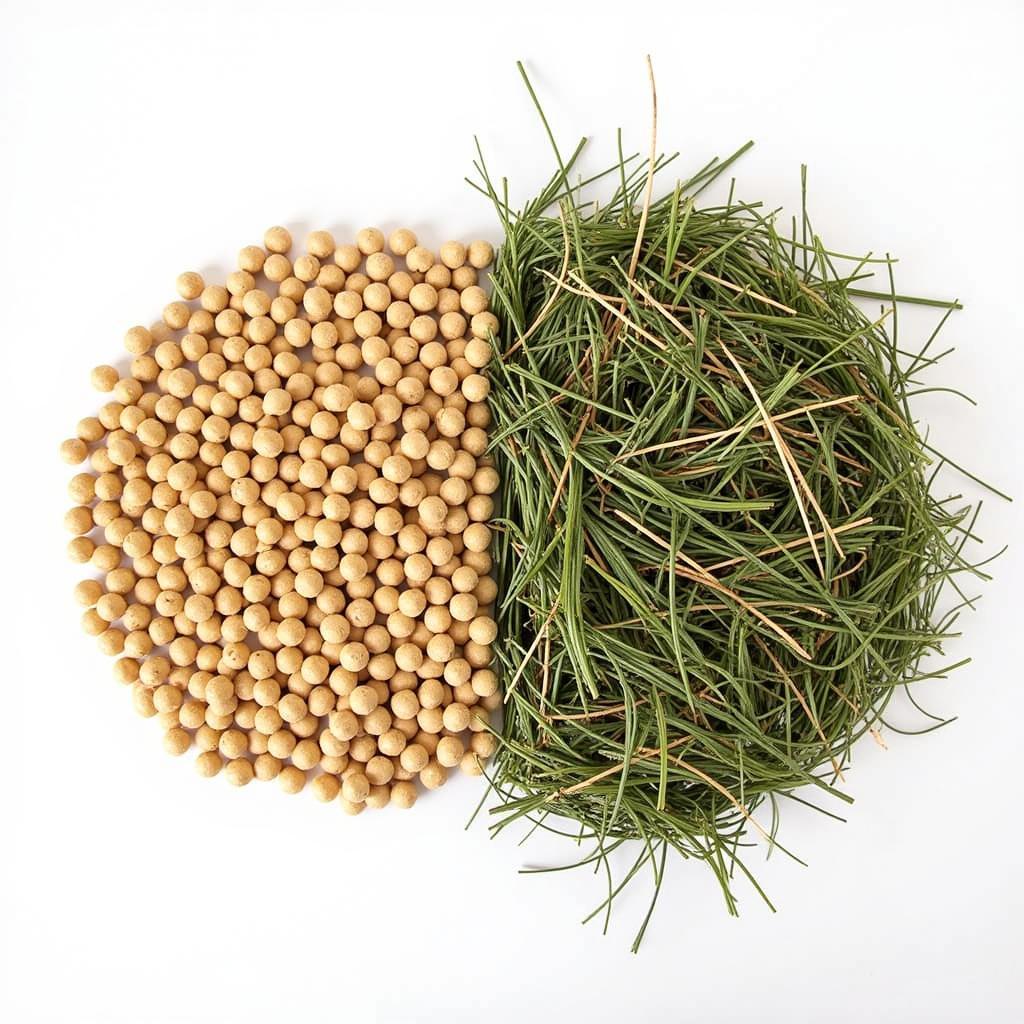Alfalfa pellets are a popular forage option for horse owners, offering a convenient and consistent source of nutrition. But like any feed, it’s essential to know How To Feed Alfalfa Pellets To Horses correctly to ensure they reap the benefits without any digestive upsets. This guide will walk you through everything you need to know about incorporating alfalfa pellets into your horse’s diet safely and effectively.
Understanding Alfalfa Pellets and Their Benefits
Alfalfa pellets are simply dehydrated and compressed alfalfa hay. They offer several advantages over traditional hay, including:
- Consistent Quality: Pellets eliminate the variability seen in different hay cuttings, ensuring your horse receives consistent nutrition with each serving.
- Less Waste: The compact form reduces waste from trampling and scattering, making them an economical choice.
- Convenient Storage: Alfalfa pellets are easier to store and transport than bulky bales of hay.
- Highly Palatable: Many horses find the taste of alfalfa pellets appealing.
- Beneficial for Specific Needs: They are particularly beneficial for horses with higher energy requirements, such as growing horses, lactating mares, or performance horses.
 Comparing Alfalfa Pellets to Hay
Comparing Alfalfa Pellets to Hay
How Much Alfalfa Should I Feed My Horse?
While alfalfa pellets offer many benefits, the key is moderation. Too much alfalfa can lead to weight gain and potential health issues. Here’s a general guideline:
- Start Slowly: Introduce alfalfa pellets gradually to your horse’s diet, starting with small amounts alongside their regular hay ration.
- Monitor Intake and Condition: Observe your horse’s weight, body condition, and manure to determine if adjustments are needed.
- Consult Your Vet: It’s always best to consult your veterinarian to determine the appropriate amount of alfalfa pellets for your horse’s specific needs, considering factors like age, activity level, and health condition.
Tips for Feeding Alfalfa Pellets Safely
Here are some essential tips to ensure you’re feeding alfalfa pellets safely:
- Choose High-Quality Pellets: Opt for pellets from a reputable manufacturer that are free from dust, mold, and weeds.
- Soak Before Feeding: Soaking alfalfa pellets for 15-20 minutes before feeding is crucial, especially for older horses or those prone to choke or digestive issues. This helps soften the pellets, making them easier to chew and digest.
- Provide Ample Fresh Water: Always ensure your horse has access to plenty of fresh, clean water, especially when feeding alfalfa pellets.
- Divide Feedings: Instead of one large feeding, divide your horse’s daily ration of alfalfa pellets into multiple smaller meals to aid digestion and prevent digestive upset.
- Transition Gradually: When introducing alfalfa pellets or making any changes to your horse’s diet, do so gradually over several days to allow their digestive system to adapt.
Can Alfalfa Pellets Replace Hay Entirely?
While alfalfa pellets offer excellent nutrition, they shouldn’t completely replace hay in a horse’s diet. Hay provides essential fiber that promotes healthy digestion and prevents boredom. Ideally, alfalfa pellets should be used as a supplement to your horse’s regular hay ration, not a replacement.
When Are Alfalfa Pellets a Good Choice?
Alfalfa pellets can be a valuable addition to the diets of:
- Hard Keepers: Horses that struggle to maintain weight on a hay-only diet.
- Performance Horses: Horses in intense work or training that require additional calories and nutrients.
- Growing Horses: Young, growing horses benefit from the extra protein and calcium in alfalfa.
- Senior Horses: For senior horses with dental problems, soaked alfalfa pellets can be easier to chew and digest than traditional hay.
FAQs About Feeding Alfalfa Pellets to Horses
Can I feed alfalfa pellets to my pregnant mare?
Yes, alfalfa pellets can be a good source of nutrition for pregnant mares, especially in the later stages of gestation when their nutritional demands are higher. However, it’s crucial to consult your vet for personalized advice.
Are alfalfa pellets suitable for horses with laminitis?
Horses with laminitis require a low-sugar, low-starch diet. Alfalfa pellets can be high in sugar, so it’s generally recommended to avoid them or feed them in very limited quantities under the guidance of a veterinarian.
Can I mix alfalfa pellets with my horse’s grain?
Yes, you can mix alfalfa pellets with your horse’s grain to add bulk and nutrition. However, ensure the pellets are thoroughly soaked before mixing to prevent choking hazards.
Do alfalfa pellets expire?
Yes, alfalfa pellets have a shelf life. It’s essential to store them in a cool, dry place and use them within the recommended time frame indicated on the bag.
My horse doesn’t seem to like alfalfa pellets. What should I do?
Some horses might be hesitant to try alfalfa pellets initially. Try introducing them gradually, mixing them with a small amount of their favorite grain or molasses.
Need More Help?
If you have further questions about feeding alfalfa pellets or any other aspect of your horse’s care, our team at Justus Horses USA is here to help!
Contact Us:
- Phone: 0772127271
- Email: [email protected]
- Visit Us: QGM2+WX2, Vị Trung, Vị Thuỷ, Hậu Giang, Việt Nam.
We offer 24/7 customer support and a wealth of resources on our website, including articles on hay pellets for horses, the fascinating spider horse, the best vitamin e for horses, and delicious treats for mini horses.